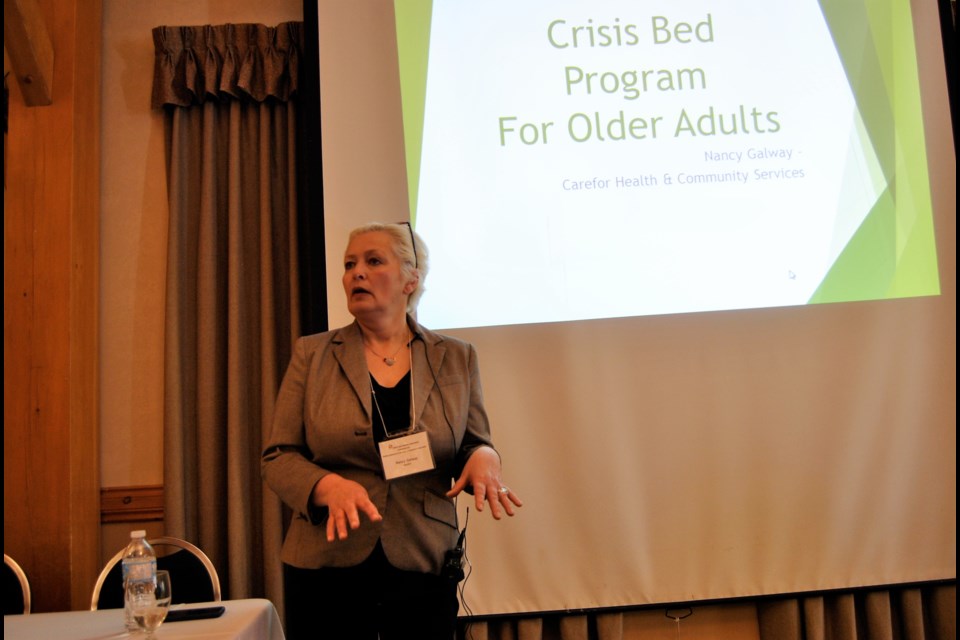Timmins hosted a conference on elder abuse Wednesday at the Cedar Meadows Resort, that addressed issues surrounding detecting and preventing elder abuse.
The conference was organized by Elder Abuse Ontario (EAO), a provincial, non-profit organization combating elder abuse.
Mayor Steve Black welcomed the participants to the conference.
“I commend all of you working to prevent and end elder abuse,” said Black. “This has become a significant concern for our communities as our population ages.”
Elder Abuse Ontario uses the World Health Organization definition of abuse as - “a single, or repeated act, or lack of appropriate action, occurring within any relationship involving seniors, where there is an expectation of trust which causes harm or distress to an older person.”
Elder abuse occurs when there is an imbalance of control; the taking control of the rights and freedoms of the senior by the caregiver; and the use of violence, intimidation, coercion, to make a senior feel powerless.
Jeannette Lindenbach, professor at Laurentian University reported on a study she is completing, on how the existing social and legal context regarding home care in Northeastern Ontario affects the way people intervene in a case of suspected elder abuse.
“It is difficult to identify elder abuse because it takes place within the context of family and legal settings where an adult child, spouse, close friend or neighbour is assumed to have the best interest of his or her family member at heart,” Lindenbach said.
Lindenbach shared quotes by individuals examining reports of elderly abuse and the frustrations the experienced in knowing something was not right, but not having the concrete evidence to take actions on behalf of the elder.
“… you go into someone’s home and things don’t feel right, and there is just a little something off…and your hair stands up on your arms, and you think oh my goodness something is going on here, but I can’t put my finger on it. And then you leave there, and that is all you can think about…it makes you wonder what’s really going on there,” said a participant in Professor Lindenbach’s study.
Nancy Galway, the Elder Abuse Prevention Coordinator, Carefor Heath Services said that there is an increase in the admissions to the Senior Crisis Bed Program Eastern Ontario she oversees.
“We started with a limit of 7 days,” Galway said. “But some people stayed much longer - we even had to book hotel rooms because there was no room at the shelters.”
Lack of funding becomes a problem as the shelters take in more abuse victims.
Professor Bill Ryan from McGill spoke about the needs of LGBT seniors and the challenges facing care workers.
“We are talking about men and women who grew up in the 1950s and 1960s when being gay was a crime,” said Ryan. “In some cases, they been shunned by their blood family.”
“Often when an elderly gay, lesbian, bisexual or transgendered person requires care at a senior’s home, or hospital and the biological family exerts control over their care, they completely shut out the involvement of the persons’ significant friends that includes their partners,” he said.
“Changes are required to ensure that the rights and choices of the elder in care are respected, regardless of their sexual preference and orientation”, said Ryan.
Professor Robert Butcher, an ethicist from the University of Western Ontario, looked at the ethical questions of who decides what is best for a vulnerable senior. He identified end of life decisions and choices around day to day living situations, such as engaging in sexual relations with another senior within a care facility.
“In whose interest, do we decide, the senior in a long-term care facility who benefits from engaging in sex which makes them happy and socially connected, or the angry husband who orders staff to put an end to the relationship?”
In end of life situations, Professor Butcher raised the issue of a patient who signed a living will 20 years previously saying they should not be fed or given medicine when the reached a certain point in their illness, but continue to take food when it is offered to them.
The final speaker was Heather Westaway, who addressed misconceptions surrounding the Substitute Decisions Act (SDA), and the Health Care Consent Act (HCCA) Ontario legislation that govern care and end of life decisions for seniors who become incapacitated.
Statistics provided by EAO indicated that between two and 10 percent of seniors are being abused annually.
Applying those numbers to Ontario, where 14.6 percent of the population are seniors aged 65 and over, there are between 40,000 and 200,000 seniors living in Ontario who have been abused.
Ontario’s population is getting older. Figures provided by the Ministry of Finance Census Data indicate, the senior population will double in Canada to almost 4.2 million, or 24.0 per cent, by 2036.
In Timmins, the seniors’ population is well above the provincial average as the Age Friendly Committee report presented to City Council in 2016 reported that 36 percent of the Timmins’ population is now over the age of 50 years. This means that 15,350 out of 43,165 residents are currently over the age of 50.
Those who suspect that their family member of friend may be a victim of elder abuse can call for assistance by phoning the Seniors Safety Line at 1-866-299-1011.
Click for more information Elder Abuse Ontario



